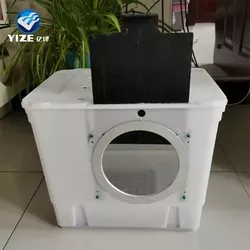High-Quality Chicken Transport Cages | Durable & Safe Solutions
Sep . 04, 2024 14:45 Back to list
High-Quality Chicken Transport Cages | Durable & Safe Solutions
The Importance of Chicken Transport Cages in Poultry Farming
In the poultry industry, the safe and humane transportation of chickens is paramount. As the demand for poultry products continues to grow, so does the need for effective transport solutions. One key component of this process is the use of chicken transport cages, which play a critical role in ensuring the welfare of the animals during transit and maintaining the integrity of the supply chain.
Chicken transport cages are specifically designed to accommodate the needs of chickens during transportation. They are typically constructed from durable materials that can withstand various environmental conditions while providing adequate ventilation. This ventilation is essential, as it helps regulate temperature and reduces stress among the birds. Stress is a significant concern for poultry, as it can lead to poor health and even death if the animals are not handled properly.
Moreover, these cages are designed with the safety of the birds in mind. Features such as secure doors and reinforced exteriors prevent chickens from escaping or being injured during movement. In addition, transport cages must comply with local and international regulations that govern animal welfare, including space per bird and ease of access for loading and unloading. Compliance not only ensures the humane treatment of the animals but also builds consumer trust in the products being offered.
chicken transport cage

Using chicken transport cages also has economic implications for poultry farming. Well-designed cages can improve efficiency during loading and unloading processes, which in turn reduces labor costs and minimizes the time animals spend in transit. This efficiency can lead to healthier birds arriving at their destination, ultimately resulting in better-quality meat and eggs for consumers.
Furthermore, advancements in technology have led to the development of innovative transport cages equipped with features like temperature and humidity monitoring systems. These additions allow farmers and transporters to continuously assess the well-being of the chickens during transit, enabling them to take corrective actions if any issues arise.
In conclusion, chicken transport cages are indispensable in the poultry industry. They ensure the humane treatment of birds during transportation, safeguard their health, and contribute to the overall efficiency of poultry farming. As the industry evolves, continuous improvements in cage design and technology will play a vital role in enhancing animal welfare and meeting the growing demand for poultry products in a responsible manner.
-
Automatic Feeding Line System Pan Feeder Nipple Drinker|Anping County Yize Metal Products Co., Ltd.
NewsJul.30,2025
-
Automatic Feeding Line System - Anping Yize|Pan Feeder,Nipple Drinker
NewsJul.30,2025
-
Automatic Feeding Line System - Anping County Yize Metal Products Co., Ltd.|Pan Feeder, Nipple Drinker
NewsJul.30,2025
-
Automatic Feeding Line System-Poultry Farming|Chicken Feeding&Watering
NewsJul.30,2025
-
Automatic Feeding Line System - Anping County Yize Metal Products Co., Ltd.|Pan Feeder Nipple Drinker,Broiler Farming
NewsJul.30,2025
-
Automatic Feeding Line System Pan Feeder Nipple Drinker-Anping County Yize Metal Products Co., Ltd.
NewsJul.30,2025






